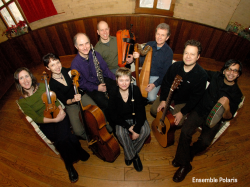 My last column, highlighting the music programming at the Aga Khan Museum, noted the concert appearance of Toronto’s award-winning group Autorickshaw at the AKM auditorium on November 15. I attended the show to get an overview of their current repertoire, the range of which is wide and the boundaries fluid.
My last column, highlighting the music programming at the Aga Khan Museum, noted the concert appearance of Toronto’s award-winning group Autorickshaw at the AKM auditorium on November 15. I attended the show to get an overview of their current repertoire, the range of which is wide and the boundaries fluid.
In addition to arrangements of South Indian classical and folk songs, original songs and numbers based on tala principles (overlapping Carnatic solkattu and Hindustani tabla bols) alternated with good-humoured ironic takes on 1970s Bollywood hit film songs. “Autorickshawified” hybrid adaptations of songs by Joni Mitchell and Leonard Cohen – “Bird on a Wire” rendered in a relaxed 7/4 – and the jazz standard “Caravan” were among my personal favourites. While vivacious vocalist Suba Sankaran, the heart of the group, claimed front stage centre for most of the concert, the skilled band comprised of Dylan Bell (bass/keyboards/beatboxing), Ed Hanley (tabla), with Ben Riley (drum set) and John Gzowski (guitar) stepping in for the night, shone in solos. “Caravan” was a rollicking example.
Well into Autorickshaw’s second decade of genre-blending musicking, summing up its repertoire, which is very often multi-genre and transnational in reach, is not an effortless undertaking; especially so for a persnickety listener like me. Autorickshaw’s website nevertheless helpfully weighs in, situating its music “on the cultural cutting edge, as contemporary jazz, funk and folk easily rub shoulders with the classical and popular music of India.”
That statement makes such hybridization sound like an easy reach. It’s anything but. Anyone who has seriously attempted it, or listened to fusion experiments where genres from across the world “easily rub shoulders,” knows how easy it is to fail to satisfy musical expectations – and for many reasons. In fact it is one of the most difficult forms of musical alchemy to pull off effectively and gracefully. Having persevered as a group for a dozen years Autorickshaw is proof that diligent work in the transcultural song mines can pay off. In their case it’s been rewarded with two JUNO nominations for World Music Album of the Year and the 2005 Canadian Independent Music Award. In 2008 they were awarded the John Lennon Songwriting Competition Grand Prize in World Music, in addition to the CAPACOA Touring Artist of the Year.
Autorickshaw’s web statement also accurately geographically locates the overlapping bi-continental musical territories the group primarily explores: North America and the Indian subcontinent. Furthermore testing the effectiveness of such transculturalism in the fire of international audiences via touring seems an essential part of the group enterprise. Autorickshaw has done just that. It’s been on the road exporting its “Canadian-made Indo-fusion” not only across its Canadian home base, the U.S.A. and Europe, but also to India during a three-week tour in late 2006.
As I write this the Autorickshaw Trio consisting of Sankaran, Hanley and Bell is preparing for an unprecedented two-month subcontinent-wide tour of at least two dozen dates in ten projected cities in India and Nepal (in Pokhara and Kathmandu). Departing Toronto on November 28, “we are acting as our own agents, mainly cold-calling our way to India and Nepal” wrote Sankaran in an email interview, building on “contacts [made] the last time we toured India.” She further predicted that “once on the ground, we will likely be approached to do other performances in the various regions we are touring. This happened the last time around as well, so we’re trying to build some buffer time for that.”
I asked about the sort of venues they will be playing. Sankaran commented on their diversity. “We are doing a variety of shows, from soft-seaters to outdoor festivals, from clubs to hotel dates, house concerts, workshops in ashrams, and collaborating with string and choral departments in schools; the majority are performances, [but] we’re offering some workshops as well.”
The incentive for the tour initially came from the group’s desire to commemorate, on December 3, 2014 the 30th anniversary of the Bhopal “gas tragedy,” widely considered the world’s worst industrial disaster. Sankaran and Hanley have a personal commitment to the affected people of that city. In 2009 they co-wrote and recorded the song “The City of Lakes.” All proceeds from the song go to the Bhopal Medical Appeal which funds two local clinics offering free healthcare to thousands of survivors. While in Bhopal the Autorickshaw Trio will also appear as the opening act at the Indian premiere of the motion picture about the disaster, A Prayer for Rain, starring Martin Sheen. Another focal point of the tour is the promotion of songs from its strong new album Humours of Autorickshaw, in newly-minted trio arrangements.
In an email interview with Hanley I wondered how exporting Autorickshaw’s hybrid music to South Asia compared to performing and marketing it domestically. He replied with insight and humour: “There may be weight to the Canadian adage that you can’t ‘make it’ at home until you make it elsewhere. I’m not sure why that seems to be true, but anecdotally it does seem to be the case. We’re not trying to make it in India, but perhaps to lay foundations for future tours … The fact that we incorporate a lot of traditional Indian classical elements in our music seems to be a gateway for South Asian audiences. It’s [also] always nice to represent Canada and Canadian music,” on the international stage, therefore “we’re looking forward to playing some Autorickshawified Joni Mitchell, Leonard Cohen and Canadian folk songs (“J’entends le Moulin” with solkattu and tabla bols anyone?)”
I asked Hanley how he expected the various genres their repertoire explores to resonate with tour audiences. “We will definitely adapt our repertoire to the venue and audience. For example we’re doing some Christmas carols with local musicians in Darjeeling – at their request. That should be fun!” He added: “New audiences are always an adventure. There is a magic in performing for people who know, and perhaps like, your music, but there’s a very different kind of magic playing for an audience who has never heard you before, hearing the music … for the first time.”
As for South Asian sales of Autorickshaw music mediated via physical product vs downloads, Hanley noted that they “will take some CDs, and will ship a box ahead. We will carry a lot of download cards, which we can give away as a musical business card, or sell much cheaper than a physical CD. [Plus] all our music is online [and we’ve uploaded] lots of videos onto our YouTube channel.”
Hanley neatly summed up the music scene in India: “It’s really happening [with] clubs popping up. There are festivals galore, with lots of bands producing original music. What we do might come from a different place simply because we grew up in Canada and have a strong Western foundation in various forms such as pop, jazz etc. And why are Indian presenters eager to present us? I’m not sure. Could it be our [unique] Canadian perspective on our blend of styles?
On one hand Autorickshaw’s two-month tour sounds like a grand adventure in (re)encountering the roots of some of the musical streams it has been exploring throughout its collective career. It will also no doubt expand the awareness among South Asian audiences of a Canadian world music accent. I for one will enjoy reading the trio’s “reports from the road,” vicariously experiencing their musical travels which will take them on December 15 to the Kathmandu Jazz Conservatory, Nepal, and on January 26 to SpringFest in Kharagpur, India.
Following are some of the stories I would likely have written about in depth had I not been sidetracked into talking about covert world music elements embedded in Canadian Christmas repertoire (Aaron Davis, page 14) and Canadian world musicians about to embed themselves in South Asia.
Small World Music Centre: December 5 Nazar-i Turkwaz (My Turquoise Gaze), four leading singers and instrumentalists on the Toronto world music scene, take the Centre’s stage. Brenna MacCrimmon, Maryem Tollar, Sophia Grigoriadis and Jayne Brown are the remarkable musicians whose appearance at the Aga Khan Museum I wrote about last month. Having collected, performed and recorded songs from Turkey, the Middle East, Greece and the Balkans for decades, you can expect masterful renditions of this repertoire, “cultivating a sweet sonic union” along the way.
December 6 may well mark a first in my column: a musical film screening. The Centre presents two films by American director Matthew Dunning collectively tilted The Stirring of a Thousand Bells (2014), released on DVD by the hipster Seattle, Washington label Sublime Frequencies. This fascinating niche publisher focuses exclusively on “acquiring and exposing obscure sights and sounds from modern and traditional urban and rural frontiers.” Its roster encompasses audio field recordings, repackaged folk and pop compilations, radio collages and DVDs, mostly from Southeast Asia, North Africa and the Middle East.
Dunning’s films take viewers on a musical-visual journey of life in Central Java, Indonesia, focussing on gamelan music, a regional orchestral practice unbroken – though continuously shifted geographically, refreshed stylistically and hybridized – for some four centuries. In the city of Solo, where a Sultan still reigns, gamelan and its meditative palace dances remain a part of everyday life. I’ve been to Java five times studying and playing gamelan, and still feel like a beginner in the face of the complex interactive music’s inner workings and emotional life. The director will be present to contextualize his own gamelan practice and his films.
Ensemble Polaris: January 18, 2015 at 2pm the Gallery Players of Niagara present Ensemble Polaris in “Definitely Not the Nutcracker” at the Silver Spire United Church, St. Catharines. This fun concert celebrates Tchaikovsky’s popular music for the ballet but with a whimsical twist. Arrangements by the Ensemble alternate with songs and instrumentals from the Russian folk tradition. The instrumentation gives a hint of what they’re up to. Marco Cera (guitar, jarana barroca); Kirk Elliott (violin, Celtic harp, mandolin); Margaret Gay (cello, guiro); Katherine Hill (voice, nyckelharpa); Alison Melville (baroque flute, recorders); Colin Savage (clarinet, bass clarinet); Debashis Sinha (percussion, birimbao) and Jeff Wilson (percussion, musical saw). This new year why not stretch your musical legs, travel to St. Catharines and experience something other than customary?
Master Shajarian: January 31, 2015 [postponed to the fall of 2015] Persian master singer, composer, teacher and instrument innovator Mohammad Reza Shajarian takes centre stage at Roy Thomson Hall. Shajarian has been widely celebrated and decorated at home and internationally. UNESCO in France presented him in 1999 with the prestigious Picasso Award, one of Europe’s highest honours. In 2006 he was decorated with the UNESCO Mozart Medal and he has twice been nominated for the Grammy for Best World Music album. I had the privilege of hearing him sing about a decade ago and was impressed with his mastery of the difficult classical dastgah idiom. His vocal performances are justly savoured for their technical beauty, power and strong emotional presence. This concert is another good way to celebrate your good luck in reaching 2015 in good nick.
Andrew Timar is a Toronto musician and music writer. He can be contacted at worldmusic@thewholenote.com.



